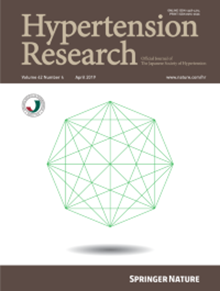家庭血压稳定性评分与更好的心血管预后相关:来自全国性前瞻性 J-HOP 研究的数据。
IF 4.3
2区 医学
Q1 PERIPHERAL VASCULAR DISEASE
引用次数: 0
摘要
以家庭血压(BP)为中心的策略正逐渐成为高血压患者实现充分血压控制的最佳方法,但目前还缺乏基于家庭血压水平和变异性的简单心血管风险评分。本研究利用日本晨涌-家庭血压(J-HOP)扩展研究的前瞻性数据,开发了一种用于预测心血管风险的简单家庭血压稳定性评分。日本晨涌-家庭血压扩展研究包括 4070 名参与者(平均年龄 64.9 岁),他们在基线 14 天内分早晚三次测量家庭血压。在平均 6.3 年的随访期间,共发生了 260 起心血管事件。根据早晚收缩压(SBP;MEave)的平均值和三个家庭血压变异性指标计算出家庭血压稳定性评分:平均实际变异性(连续测量之间的平均绝对差值)、平均峰值(每个人三个最高 SBP 值的平均值)和治疗范围内的时间(MEave 家庭 SBP 为 100-135 mmHg 的时间比例)。家庭血压稳定性评分与心血管事件风险之间呈曲线关系。与最佳家庭血压稳定分数组(9-10 分)的人相比,极高风险组(0 分)的人在随访期间的心血管事件风险明显更高(调整后危险比为 3.97,95% 置信区间为 2.22-7.09;P<0.05)。本文章由计算机程序翻译,如有差异,请以英文原文为准。

Home blood pressure stability score is associated with better cardiovascular prognosis: data from the nationwide prospective J-HOP study
A home blood pressure (BP)-centered strategy is emerging as the optimal approach to achieve adequate BP control in individuals with hypertension, but a simple cardiovascular risk score based on home BP level and variability is lacking. This study used prospective data from the Japan Morning Surge-Home Blood Pressure (J-HOP) extended study to develop a simple home BP stability score for the prediction of cardiovascular risk. The J-HOP extended study included 4070 participants (mean age 64.9 years) who measured home BP three times in the morning and evening for 14 days at baseline. During the mean 6.3-year follow-up, there were 260 cardiovascular events. A home BP stability score was calculated based on the average of morning and evening systolic BP (SBP; MEave), and three home BP variability metrics: average real variability (average absolute difference between successive measurements); average peak (average of the highest three SBP values for each individual), and time in therapeutic range (proportion of time spent with MEave home SBP 100–135 mmHg). There was a curvilinear association between the home BP stability score and the risk of cardiovascular events. Compared with individuals in the optimal home SBP stability score group (9–10 points), those in the very high-risk group (0 points) had significantly higher cardiovascular event risk during follow-up (adjusted hazard ratio 3.97, 95% confidence interval 2.22–7.09; p < 0.001), independent of age, sex, medication, cardiovascular risk factors, and office BP. These data show the potential for a simple home BP-based score to predict cardiovascular event risk in people with hypertension.
求助全文
通过发布文献求助,成功后即可免费获取论文全文。
去求助
来源期刊

Hypertension Research
医学-外周血管病
CiteScore
7.40
自引率
16.70%
发文量
249
审稿时长
3-8 weeks
期刊介绍:
Hypertension Research is the official publication of the Japanese Society of Hypertension. The journal publishes papers reporting original clinical and experimental research that contribute to the advancement of knowledge in the field of hypertension and related cardiovascular diseases. The journal publishes Review Articles, Articles, Correspondence and Comments.
 求助内容:
求助内容: 应助结果提醒方式:
应助结果提醒方式:


